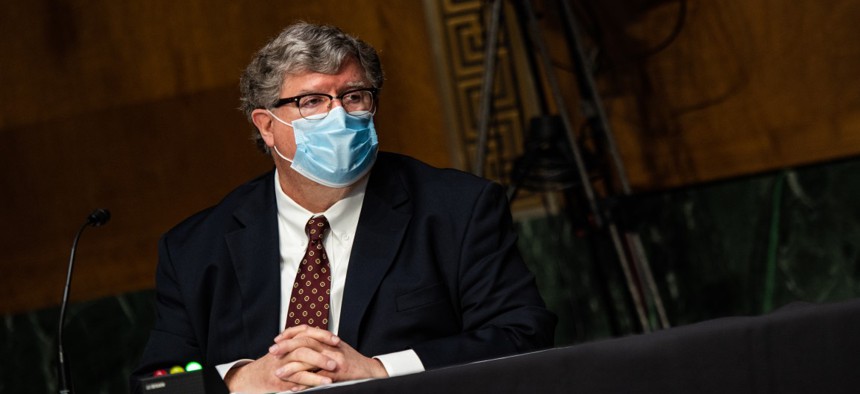
Pool/Getty Images
A Federal Pandemic Watchdog Says its Oversight Money Will Run Out in July
Brian Miller, special inspector general for pandemic recovery, wrote in a new report that $25 million in CARES Act start-up funds is not enough.
A federal watchdog, created specifically for the coronavirus pandemic, is warning it is running out of money, and without a cash infusion will have to cease its oversight activities.
The Office of the Special Inspector General for Pandemic Recovery, established by the CARES Act, issued its latest quarterly report on Monday about its oversight efforts into certain pandemic programs as well as issued a dire warning.
“Unless Congress acts, my office will run out of money in July 2022,” wrote Brian Miller, special IG for pandemic recovery in an opening message in the report. The $25 million in “start-up funds” from the CARES Act, enacted in March 2020, “is not enough money to establish a new law enforcement agency and maintain it through a five-year term,” he continued. During the first 15 months, the office spent about half the sum on overhead of the Treasury Department, leasing offices and paying its employees.
“We estimate that there is about $22.5 billion in outstanding Treasury loans and investments within our oversight,” Miller said. “Offices with comparable missions operate on greater budgets. Congress, for example, gave the Special Inspector General for the Troubled Assets Relief Program $50 million in start-up funds and additional funds each year.”
Miller said that his office has been working with the Treasury Department, members of Congress and the Office of Management and Budget for more than a year to try and get the office included in the annual appropriations cycle.
President Biden’s budget request would give them $25 million and the Senate appropriations bill gives them $10 million, however Congress has yet to come to an agreement on fiscal 2022 year funding and is currently operating on a continuing resolution, Miller noted. The current continuing resolution runs through Feb. 18.
“Because SIGPR has not been part of the annual appropriations cycle, we do not receive a pro rata share of last year’s budget,” Miller continued. “As a result, SIGPR is nearing exhaustion of its CARES Act appropriation.”
He noted that in testimony during his confirmation hearings he requested a staff of 75 to 100 full-time employees, but currently only has 52. The office has had to put hiring plans on hold as well as been forced to stop entering new contracts even for an e-discovery tool they desperately need.
Miller previously asked to be included in the annual appropriations cycle in other reports. In a report published in July 2021, the office said that “the receipt of additional funding is critical to SIGPR’s success. Without it, SIGPR will not have the ability to continue its oversight mission.” However, the message is more extensive in this latest quarterly report.
Despite the financial woes, Miller lauded what his team has been able to accomplish. He underscored the need for continued oversight as the pandemic is not over and there has been unprecedented spending that has been susceptible to fraud. Without a funding boost, “for the first time in history, an inspector general office will close prematurely for want of funding,” he wrote.
Miller’s message reflects reporting by The Washington Post on Friday about a series of letters he wrote to members of Congress about the cash crunch.
Besides budget issues, last April Miller argued there were “turf” battles with the Treasury Department and Treasury IG following a legal opinion from the Justice Department that narrowed the scope of his office’s purview. In subsequent reports, the office has updates on its progress or continued issues with other agencies as well as complications related to starting up a new office amid the pandemic.
In addition to the IG office, the CARES Act also created the Pandemic Response Accountability Committee and Congressional Oversight Commission.







